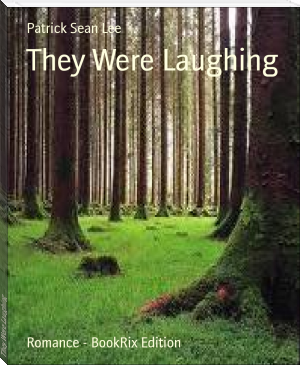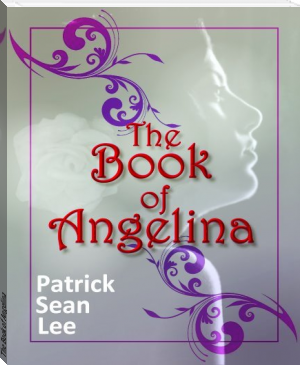They Were Laughing - Patrick Sean Lee (good books to read for beginners TXT) 📗

- Author: Patrick Sean Lee
Book online «They Were Laughing - Patrick Sean Lee (good books to read for beginners TXT) 📗». Author Patrick Sean Lee
AUTHOR NOTE
They Were Laughing was an important chapter in my second novel, "One Year On Meade Street" for several reasons, chief among them: It was the close up and personal (finally) meeting of Skip and Carol. He had seen her practicing ballet on her front porch months ago, and a serious case of puppy love struck...and stuck. Secondly, it hearkened the reader back to first page of the book, the Prologue...
PROLOGUE
1980
It is near dawn, March 21st, and I haven't slept. I've been staring at a spot on the wall half the night—a particular spot, that when the moonlight is just so, lights up the picture I hung there many years ago. A small photograph in a simple wooden frame. I turn my head slightly to see if I can find it and make it come alive by the strength of my will alone, by changing my perspective, but it is hopelessly lost in the dimness of the room.
Outside, the gray dawn slowly climbs the arc of nighttime sky, pushing the moon gently along before it. Soft shadows awakened force their way through the frosted glaze of glass, across the bedroom walls in search of the picture. I turn and follow the weak light back out the window for a moment. I can see the dusty fingers of smoke from a fireplace chimney somewhere nearby curling without effort, skyward, waiting patiently to be absorbed high above me, out of reach. It reminds me of what happens to love, really, in the end. Absorbed into other worlds…taken far away from us because of laws that now I know we simply cannot comprehend.
The photograph of Jimmy and Carol is with me here in my old room, but they are gone.
They are only part of the shadows, now, kneeling in a brown and ochre field of leaves, caught forever, captured, with their arms thrust upward. The leaves they'd just thrown are still in jumbled, carefree movement, ever frozen in that moment. They were laughing.
1957
THEY WERE LAUGHING
It rained the last two days of September. Another mysterious dumping, like the terrible snowstorm last spring, but this deluge was simply wet. Gutters overflowed and swept debris along helplessly. A few brave kids in slickers and red galoshes splashed merrily against the flow, sending plumes of gray, freezing water rooster-tailing upward. The trees shivered in the wind, unprotected this early in the season without the gloves of snow that would arrive within a month and stick to their barky fingers and gnarled arms. Saturated leaves of red and gold and brown clung desperately to the branches, waving madly at the kids, warning them to get out, get home before the flood.
I stood in the living room in my house, staring out the front window as the sky grew darker, wringing its endless self out, refusing to budge eastward toward the plains in the inadequate, tugging grip of the wind. But then as suddenly as it had begun, the lashing ended. A warm sun falling ever farther down the horizon line peeked out and sent tangential rays streaking across the dark green grass, covered, now, with a mantle of newly fallen leaves. More leaves. Yes. And then more.
It was late afternoon, October 1st, when the sound of Jimmy calling urged me out the door. For once it wasn’t trouble he wanted to introduce me to, exactly, just gathering all the leaves into a combustible heap.
I was thankful he’d rescued me from the boredom of watching the sun; watching weak trails of steam drift upward from the street pavement. I left the house, grabbed a rake, and we began the seasonal task.
We raked the leaves into piles, giant piles in which an army of Lilliputians could easily hide. We pushed and pulled them toward the front fence in my yard and the low hedge in his. Jimmy and me, all by ourselves. After a while I began to feel like a salmon trying to swim up a waterfall. The leaves just kept coming down.
We talked of many things as we worked, and sometimes Jimmy even made sense. I would have listened to his wild statements and his nonsensical responses to my questions even had he not, though. Jimmy was more my brother lately than ever before, and it occurred to me that Fall was not the sad ending of a weird and wondrous summer, but rather the grand beginning of another, different, exciting chapter in both our lives. We were growing in a hundred new, impossible directions suddenly. It was confusing, but we were in it together like never before. Like only brothers could be. I smelled something absolutely kind and all-encompassing floating in the air. Some benevolent spirit coursing over the two of us.
Under the supervision of Pop with his umpteen bottles of beer, Mom with her never ending battery of instructions and observations, and Mrs. McGuire with her faithful lover, Jim Beam, clutched by the neck in her hand, Jimmy and I would over the next few days get all the leaves together, and then we’d set them ablaze—if they ever stopped falling long enough for us to herd them up. And if the sun had done its duty during the previous week. But if the blaze weakened because of rain that refused to be burned out of them, then we’d just smoke them into eternity. That would be okay, too. There were fewer smells as pungent and aromatic as basted elm leaves.
Early fall, chilly nights, fires in the front yards; these were maybe the finest of days. Magical days that stretched across the city and the universe into an almost-eternity of falling asleep in God’s lap—until the gray at last descended in what at first would seem a permanent, frozen end to an enchanted autumn life.
My rake’s tines scraped the surface of the mottled grass adding a bewitched but sensible, identifiable, pleasurable sound to the smell of decaying foliage. As he labored twenty-five feet away in the cool air, Jimmy reached into the beret he’d started wearing and pulled out his own peculiar enchantment, one that he loved.
“…who coughed on the sixth floor of Harlem crowned
with flame under the tubercular sky surrounded
by orange crates of theology,
who scribbled…”
He recited the lines from Howl in a reverential voice, in cadence with the movement of his rake. He in his yard, I in mine.
I loved him. I mean, since stumbling over Sarah’s eyes and crazy notions about Beats, he’d suddenly gone from spikey-haired Puck of Meade Street to inspired sprite of the urban canticle. I don’t know if he had any idea what the poetry he spewed out meant, but he spewed it out with the zeal of a tent preacher.
“Crap, Jimmy, that doesn’t make a bit of sense. None at all,” I called over at him.
“ ‘Course it makes sense! You just need to listen more careful. Quit reading that ‘Mary had a little lamb’ shit…”
Jimmy continued to recite Howl, which got worse and worse as the stanzas dragged by. He picked up the tempo of the words. His rake reciprocated by skipping over the grass more quickly in order to keep up.
“I don’t think they’ll ignite,” I said, trying to get him to shut up and carry on something like a normal conversation with me for a change. Instead, he answered with “…who were burned alive in their innocent flannel suits on Madison Avenue amid blasts of leaden verse…”
He was hopeless today. Wound up. Synthesizing his distressing Beat world to the upbeat reality of an existence that I think rasped at something deep in his soul. I am in this world but not of it. Me and Sarah.
Sarah. He’d met her up in the Rockies last summer. Her folks had hauled her out here from New York City with them to stay up at Cabin Creek. They’d rented a cabin close to the one my folks and his mom had rented. Jimmy and Sarah met, of course. I mean, two wacked out suns coming into close proximity—they were bound to collide. And they did. He flipped out for the first time in his life over something other than terrorizing our neighborhood, and when she went home, and we went home, the long distance bill on his mom’s phone shot into the stratosphere.
“They’ll ignite. I’ll get the gas can if the fuckin’ things get stubborn.”
I understood those two sentences very clearly. Okay, so he might burn down the Morley residence or our beloved elm tree, but at least Jimmy was making sense again. And yet, I was enthralled in a queer way with his idiotic ramblings.
“Hiya, fellas!”
Well, who could that be? Whose nasaly voice was perfectly distinguishable from that of anyone else’s on the planet? I turned my head but continued pulling the leaves toward the front with the rake for a minute, toward the damaged fence and a smaller, neighboring pile. It was Allen, of course, who had stopped on the street sidewalk. He looked like a tourist who’d just stepped off the bus from North Dakota—a camera dangling on a braided cord from his neck, black slacks, white socks and shirt, and Union Jack-colored sport coat yanked straight off the racks at Sears Roebuck. Beside him stood Carol Hudson, ablaze in a calf-length Irish tartan kilt and a black sweater. Yin and Yang. Ugly and lovely. I happened to be madly in love with her, and I’d hoped she felt exactly the same. But on the arm of that little dork?
“Geez, Allen! Where’d you steal that coat from?”
“I LIKE it!” Jimmy popped.
“Huh?” I answered.
“Moloch! Beast of San Francisco! Cowboy of the moon! Whore of Denver!” Jimmy went on. Probably the best choice of words possible—they mirrored my thoughts about Allen exactly.
Ok, maybe I was mistaken. Maybe standing out there was the very hip 1957 Denver version of Beat fashion. Sort of like Leo Peepers as the Denver version of Dick Clark, or a rowboat being just a midget version of the Queen Mary. Yeah, that was it. That would explain his high-water pants and white socks. But, nothing, nothing could explain the jacket. It just wouldn’t work anywhere, in any era—but it was truly Allen, and it was truly something I could imagine on the body of a hideous beast with a hundred eyeballs crawling out of the San Francisco Bay.
To my surprise Carol left his side immediately and walked up the small incline of grass and leaves to the fence. If she was put off by his attire, her smile masked it. As a matter of fact, she seemed wholly oblivious of his presence when confronted by my aura. I laid my rake aside and leaned my arms onto the bent top rail of the fence.
“Hi!”
“Hi.”
“What’s up?”
“Nothing. Just walking home.”
“Oh. I’m raking leaves.”
“Yes, I can see that.”
“Wanna’ come in?”
She beamed. Adjusted her glasses a little higher on the delicate bridge of her nose. “I suppose so. Yes, that would be nice.”
I rushed over to the front walk and unlatched the gate. Allen stood silent, with that dumbass grin he’d patented splattered on his face. He was watching me, the little twerp, and I figured he was taking notes on how to treat the right girl when he finally met her. I could only imagine what kind of ogre that would have to be. He followed us into the yard.
Jimmy? I don’t know. He stood otherworldly, like a statue downtown under the courthouse portico, most likely searching through his memory banks for another appropriate verse.
To my surprise, Carol brushed past me and walked across the dark





Comments (0)